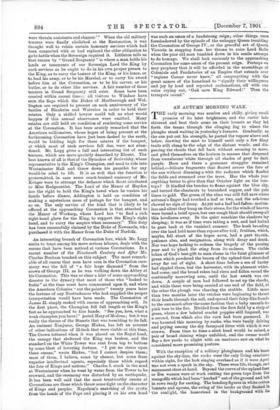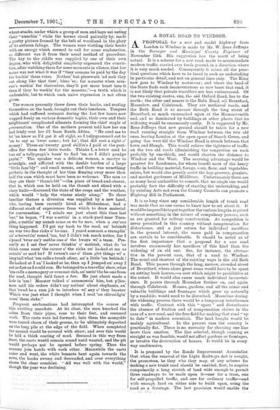AN AUTUMN MORNING WALK.
THE early morning was sombre and chilly, giving. small promise of its later brightness, and the carter lads shivered and beat their arms on their breasts as they led forth the teams through the clinging fog to where the ploughs stood waiting in yesterday's furrows. Gradually, as the sun put out his strength, he parted the.vapour above and below, drawing the mist to himself until only a few filmy trails still clung to the edge of the distant woods, and die, parsing, the clouds that fell back without seeming to move, and piled themselves on the horizon in masses that deepened from translucent' white through all shades of grey to dark purple. Here and there a gossamer straggler remained behind,—delicate fragments that floated across the face of the sun without dimming- a whit the radiance which flooded the fields and streamed" over the trees. Has the whole year anything better to give than that October light on the tree- tops ? It kindled the beeches to flame against the blue sky, and turned the chestnuts to burnished copper, and the pale limes to gold. The green of the elms was still full save where autumn's finger had touched a leaf or two, and the ash-trees showed no sign of decay. As yet not a leaf had fallen: motion- less and silent they hung on their stems, for the svindi of heaven were bound a brief space, lest one rough blast should sweep all this loveliness away. In the quiet sunshine the shadows lay sleeping; it was as if time were taking a rest, and had halted to gaze back at the vanished summer. The hush brooding over the land held more than repose after toil; fruition, which, maybe, fell 'short of the hopes sown, had a part the patience also, and resignation, along with decay and death. :Nor was hope lacking to redeem the tragedy of the passing year and to pluck the sting from its sadness. The visible token of God's best gift to man shone in the faint glimmer of green which powdered the brown of the upland that stretched away far but of sight. A short time before a sea of barley had rippled there, but the harvester, with its pleasant whirr, bad come, and the broad rakes had risen and fallen round the continually narrowing area, until the last swath was cut down. A couple of men had followed to set up the shocks, and while these were being carried at one end of the field, at the other the plough was cleaving the stubble. Little more than two months later the vetches were beginning to thrust their heads through the toil, and spread their fairy-like fronds to the sun much after the same fashion that a baby uncurls ib pink toes to the fire. Divided from the first field by a strip of grass, where afeve belated scarlet poppies still lingered, was a second, from which also the corn had been garnered. It was haunted this morning by rooks, who were busily delving and prying among the dry farmyard litter with which it was strewn. From time to time a sleek head would be raised, a pale of broad shining wings unfolded, and the owner would flap a few yards to alight with an unctuous can on what he considered more promising pasture.
With the exception of a solitary ploughman and his team against the sky-line, the rooks were the only living creatures within sight, for the lark singing overhead as if it were April wets not even a speck in the sky. There were life, though, and moyement close at hand. Beyond the curve of the upland four or five women were at work cutting the green tops from the mangolds which had been " bucked " out of the ground and left in rows ready for carting. The bending figures in white cotton bonnets and aprons, the swing of the hooks as they flashed in the sunlight, the homestead in the background with its wheat-stacks, under which a group of men and boys-sat eating their "nunchin" while the horses stood patiently by, made a pretty picture framed by the belt of woodland in the glory of its autumn foliage. The women were wielding their hooks with an energy which seemed to call for some explanation, so different was It froth their usual method of procedure. The key to the riddle was supplied by one of their own degree, 'who with delightful simplicity expressed the convic- tion, after watching them for some moments in silence, that her name wits not what it was if "they °omens be paid by the day fur huekin' them rutes. Nothen' but piecework 'ad mek they cut along like that .ther', bless 'ee; for a-eoorse when arra- one's workin' fur theirselves, they'll put moor heart into it than if they, be vrorkin' fqr the measter,"—a. truth which is undeniable, but to which such naive expression is not often given.
The women presently threw down their, hooks, and seating
themeelves on the bank, brought out their luncheon. Tongues which had suffered restraint during the last few hours now wagged freely on various domestic topics, their own and their neighbours' complicated ailments forming the chief staple of conversation. One of the mothers present told how her son had lately sent her £2 from South Africa. "He axed ma to let 'un know as I'd got it all right, so I tallygrammed out to '1m to say as 'twur come ; but lor', that did cost a sight o' money! Three-an'-twenty good shillin's I paid at the post- offiee fur them few little words. Thinks I, a letter med be lost an' a tallygraph's boun' to find 'un, so I didn't grudge pay-in'." The speaker was a delicate woman, a martyr to neuralgia, and afflicted with the double burden of a large "little fam'bly ". and small means, and there was something pathetic in the thought of her thus flinging away more than half the sum which must have been so welcome. The men as they ate their " thumb-bit "—the piece of bread-and-cheese, that is, which can. be held on the thumb and sliced with a clasp knife—discussed the state of the crops and the weather, which would "help the winter nicely along." To these familiar themes a diversion was supplied by a new hand, who, having been recently hired at Michaelmas, had a different stock of experiences from which to draw material for conversation. "1 minds me just about this time last 'ear," he began, "1 wur a-settin' in a stack-yard near Turn- pike, a-yettin' my winch same as we be now, when a eur'crus thing happened. I'd got my back to the road, an' behindt ma war two fine ricks o' be-tins. I yeard summat a•tramplin' an' a-brivettin' round 'um, but I didn't tek much notice, fur I s'posed 'avatar on'y mebbe one o' the bwoys wi' a teem. Pre- se,nly as I sat ther' never thinkiii o' nothink, what do 'ee think come roan' the earner o' the ricks an' looked at ma as eunnin' as med be P If twarn't one o' them girt things wr a long tail what 'tnn calls a trunk afoor, an' a little 'un behiudt ! He looked at I an' I looked at he, then up I jumped an' away I out as fast as I could run. He belonged to d travellin' show, what 'um calls a neenaagery or sum mat sich, an' seem" the beams from the road, thought he'd fancy a few. He just about made a hole in 'urn! Measter talked o' summonsixe him, but plice; man said his orders didn't say nothen' about elephants, an that 'twud be a. ruin job to interfere wr any o' they beastes- Which weir just what I thought when I seed 'un skirmidgin' roan' them ricks."
Frequent exclamations had interrupted the course of
this exciting anecdote. At its close, the men knocked the ashes from their pipes, rose to their feet, and resumed work. The carts were led forward; into them the mangolde were tossed shorn of their greens, to' be ultimately deposited on the long pile at the edge of the field. When completed the mound would be covered with straw, and over this would be laid a thick coating of mud. Secured in. this way from frost, the roots would remain sound until wanted, and the pit would perhaps not be opened before spring. Thus the seasons join hands -with each other.. Meanwhile the carts came and went, the white bonnets bent again towards the rows, the hooks swung and descended, and over everything shone the clear sunshine. All was' well with -the world," though the year was declining.































































 Previous page
Previous page